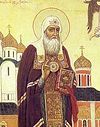

| Previous day | Next day |
| Old Style
February 17
|
Thursday |
New Style
March 2
|
|
1st Week of Great Lent.
Tone 3.
Великий пост. |
Monastic rule: xerophagy (bread, uncooked fruits and vegetables).
|
![]() Great-martyr Theodore the Tyro (306).
Great-martyr Theodore the Tyro (306). ![]() St. Hermogenes, patriarch of Moscow and all Russia (1612).
St. Hermogenes, patriarch of Moscow and all Russia (1612).
St. Mariamne, sister of Apostle Philip (1st c.). Uncovering of the relics of Martyr Menas the Most Eloquent, of Alexandria (889). St. Theodore the Silent, of the Kiev Caves (13th c.). St. Barnabas, elder, of Gethsemane Skete of St. Sergius Lavra (1906).
Weeping “Tikhvin” Icon of the Most Holy Theotokos, St. Elias Skete, Mt. Athos.
St. Auxibius, bishop of Soli on Cyprus (102). St. Finan, bishop of Lindisfarne (661). St. Theodosius, monastic founder at Mt. Kelifarevo (1363), and his disciple St. Romanus (14th c.), of Turnovo (Bulgaria). New Martyr Michael Mavroeidis of Adrianople (1490). New Martyr Theodore of Byzantium, at Mytilene (1795). New Hieromartyr Theodore of Adjara, hieromonk, at Mt. Athos (1822). St. Nicholas Planas, priest, of Athens (1932). Synaxis of Holy Emperor Marcian (457) and St. Pulcheria, his wife (453).
Repose of Elder Agapitus of the Kiev Caves (1887) and Schemamonk John (Shova) of Kolitsou Skete, Mt. Athos (2009).
Thoughts for Each Day of the Year
According to the Daily Church Readings from the Word of God
By St. Theophan the Recluse

Thursday.
Fear the Lord, and depart from evil (Prov. 3:7). Set this as the goal of your preparation for Holy Communion, so that at the end of this preparation the fear of God will dwell in you, and a firm intention to avoid every evil will take root, even if you should have to lose everything, including your life, in order to do so. Do not limit yourself to an external routine of preparation alone, but focus in particular on yourself, enter within yourself and examine your views, whether they are in agreement in all things with the true word of God. Examine your inclinations and dispositions, whether they are what the Lord demands of you in the Gospels. Examine your whole life, whether it agrees with God’s commandments in every way. Mourn and hate whatever is offensive to God, and set in your mind never to do it again. If you do this, you will be most wise; but you would most unwise not to do this.
Articles
 Greatmartyr Theodore the Tyro (“the Recruit”)In memory of this occurrence, the Orthodox Church annually celebrates the holy Great Martyr Theodore the Recruit on the first Saturday of Great Lent. |
 Martyrs Menas the Most Eloquent, Hermogenes, and Eugraphus, of AlexandriaThe Holy Martyrs Menas, Hermogenes, and Eugraphus suffered for their faith in Christ under the emperor Maximian (305-313). |



